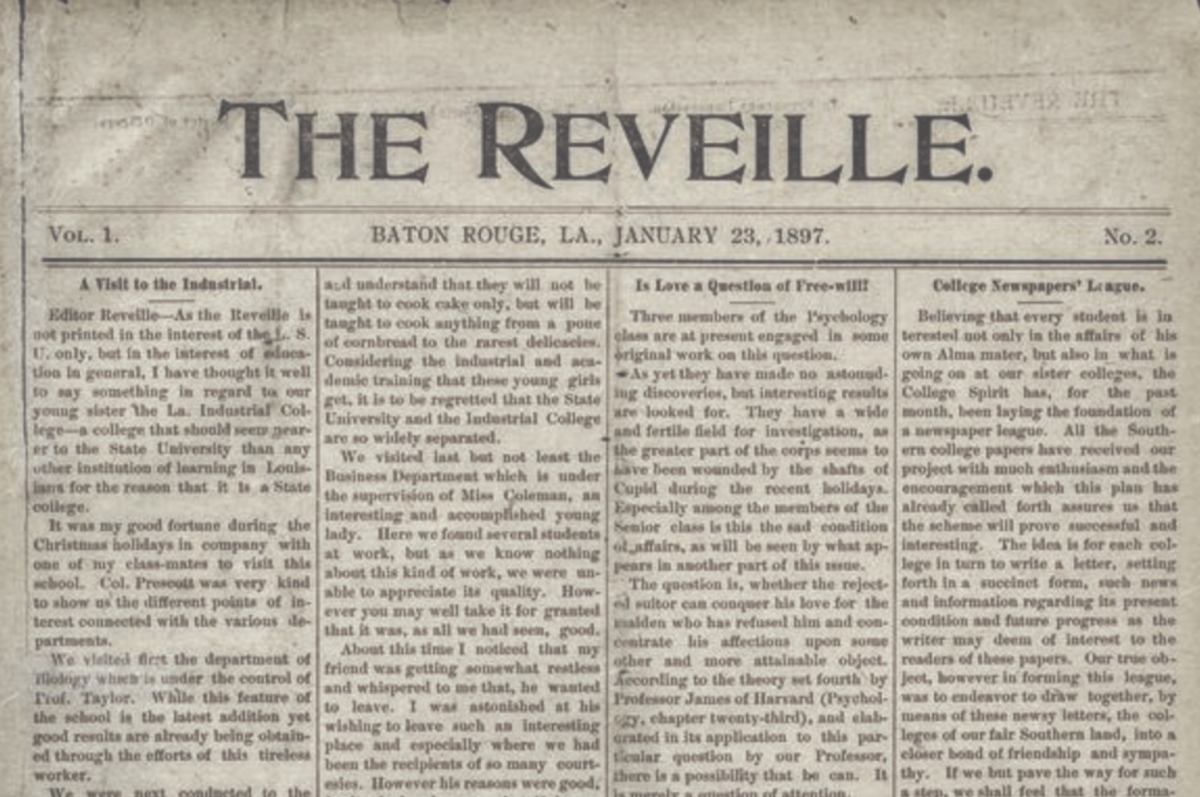Through hurricanes, fires and controversy, few elements of LSU’s campus remain as they were when the university was founded; however, one element still stands from the founding era: the Reveille.
A newspaper as old as the Louisiana constitution, reporting on events like Elvis’ death, the corruption of Huey P. Long and football domination year after year. The knowledge stored in the Reveille alone rivals even the most extensive databases. Established in 1887, the university’s beloved newspaper was named in homage to the school’s French and military roots, a name that signals the arrival of timely knowledge, inspires readers and carries the weight of the history of the university.
The history of the Reveille is an incomplete one. Although the LSU library houses almost all of the Reveille publications, many key ones are missing; most notably, the very first issue. In this inaugural paper, editors likely laid out the goals of the publication and highlighted its historical significance.
During this time students faced issues like the yellow fever outbreak in Louisiana and the Thibodaux Massacre, which were potentially reported on in the initial publication of the Reveille. Without access to the earliest editions, many questions remain unanswered, including, why is the paper called the Reveille?
It is critical to look back at the history of Louisiana State University to examine the origin of the word Reveille and draw connections to answer the question. LSU began as an all-male military academy in 1853, originally known as the Louisiana State Seminary of Learning and Military Academy. Each morning students were awakened to trumpets blaring the morning bugle call known as “The Reveille.”
This call comes from military traditions originating in 1812 that call soldiers to stand up and salute, acknowledging the day ahead. “The Reveille” call in the morning created a sense of comradery and strengthened unity between students since everyone on campus, no matter who you were, had to begrudgingly stand up and salute the day.
The name of this call, “Reveille,” comes from the French word réveil meaning to wake up. In 1887, Louisiana was still heavily influenced by the French Colonial roots that prevailed in the region until the early 1800s, just 80 years before the first publication of the Reveille. Today, French influence can still be seen across campus: the architecture, the iconic cheer “Geaux Tigers” and our very own newspaper title, the Reveille.
When the paper was founded, LSU was experiencing a period of dramatic change. On Oct. 15, 1869, a fire destroyed the seminary building. The library lost all of its books, scientific equipment was permanently destroyed and the school was forced to relocate. On Nov. 1, 1869, the school moved to the State Institution for the Deaf, Dumb and Blind in Baton Rouge. The new LSU location struggled to compete for funding against the Louisiana Agricultural and Mechanical College and Tulane.
Louisiana State University eventually merged with the agricultural and mechanical college, turning the tide in the university’s history. In the same year, the Reveille was founded. The change in administration and location meant new beginnings for LSU. Students at the time knew the newspaper needed a name that accurately reflected the turning of a page in LSU history.
The title of the Reveille fits perfectly by honoring and acknowledging LSU’s history as a military academy with Acadian roots, while suggesting a fresh start and the oncoming of a new era. In many ways, a wake-up call is the perfect metaphor for a newspaper. Just as the bugle’s trumpet calls soldiers to start their day with discipline and awareness, the Reveille delivers timely information to students signaling them to rise and stay informed.
Many Americans’ routine of reading the paper over breakfast brings structure and consistency. The Reveille has been part of LSU’s daily rhythm since the 1800s, calling students and staff alike to rise to the occasion, engage with the world and carry forward our university’s legacy.
Why are we named the Reveille? An explanation of LSU’s newspaper’s name and origin
By Carl Dexter
November 1, 2024
The 1897 print edition of the Reveille via the LSU Libraries Special Collections, Daily Reveille newspaper collection.







